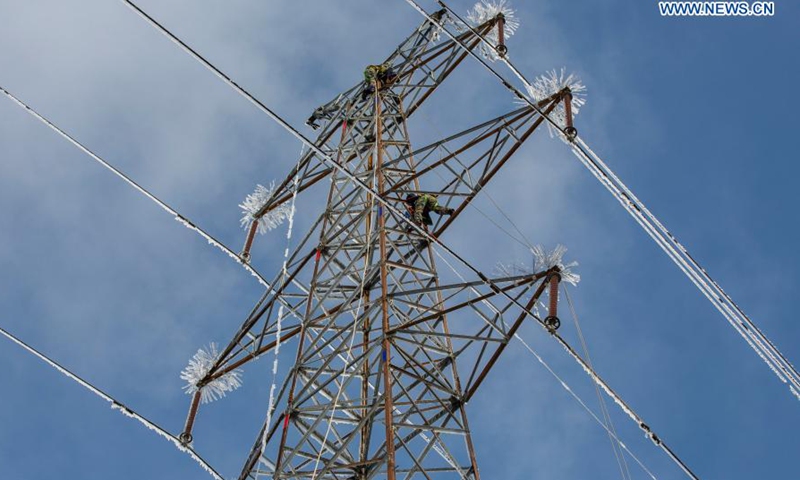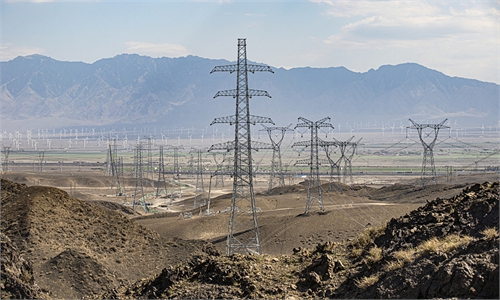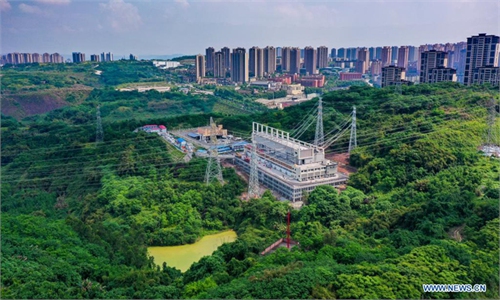
Photo taken on Nov. 20, 2020 shows technicians of State Grid Yanbian Power Supply Company repairing power supply lines in Dunhua of Yanbian Korean Autonomous Prefecture, northeast China's Jilin Province. Power supply has been affected due to extreme weather in Yanbian Korean Autonomous Prefecture recently. After thousands of technicians expedited maintaining the high-voltage wires, the power supply has been restored for over 160,000 households as of 11:00 a.m. on Nov. 22. Photo: Xinhua
Some regions in Northeast China have tightened power supply in recent days. Some communities imposed power cuts without giving residents any notice in advance. This has triggered dissatisfaction and debates on China's power supply. Electricity in residential areas should not be used to regulate. It is irrelevant to the goals of China's "dual controls." This broad consensus, which was reached by the private sector and the government, needs to be firmly implemented.The electricity supply of the country is abundant. China's installed power generation capacity stands at 2.28 billion kilowatts, about twice that of the US. Such total power generation is used to support China's GDP, which is about 70 percent of the US', and even considering its large share of manufacturing, there is still a large room to achieve it.
From a long-term perspective, China's commitment to carbon peak and neutrality will confine the country's further expansion of electricity generation by carbon. The disorder resulting from power rationing in Northeast China has revealed that it is not easy to coordinate power supply and improve power efficiency. We have to make great efforts.
The distribution of electricity in China is allocated by administrative power, but the degree of marketization of the national economy is already very high. The lack of connection between the two systems will definitely lead to some inefficiency and disorder. Solving this big contradiction should be our main direction to improve the efficiency of electricity use.
Ensuring residential access to electricity should be the priority of all electricity distribution plans. Power outages in community should be a last resort to preventing overall grid risks, and requires early warning. Outages in some communities in Northeast China violated this principle, and related authorities should make significant improvement.
In this context, China should first restrict the enterprises with high energy consumption according to different situations. China has such a large population and a considerable number of energy-intensive enterprises are necessary because they are the foundation of people's livelihood. However, there are also many export-oriented enterprises with high energy consumption in South China, and their overall economic returns are relatively low. These companies should be included in the scope of restrictions, and be guided through levers such as taxes and electricity prices to make voluntary and predictable rectification. That would be far better than the effect of mandatory outages on the market environment.
It is also necessary to carry out market regulation in the distribution of electrical consumption quota. For example, a company can have basic power consumption quota. If its efficiency and market prospects are good, and the electricity usage quota is not sufficient, it can purchase more quotas from regulators or from other enterprises. This will help the limited power flow toward the direction of efficient production.
There is still considerable room to adjust off-peak electricity consumption and save on electricity. However, they basically remain a slogan in China. They still lack exploration and demonstration, as well as specific guidance from the government. Moreover, they are yet to be considered as part of the lifestyle.
China has to accelerate the development of nuclear energy, hydroelectric power, wind power, and solar power. Society needs to support the buildup of each type of clean energy. We should reduce the proportion of coal-fired power generation as soon as possible. We are destined to become a global superpower in terms of power generation, but we cannot always be a superpower with a high proportion of coal-fired power generation among major economies.
The problems caused by recent power curbs in Northeast China should increase the sense of urgency for Chinese society to implement sustainable development and strengthen the coordinating use of electricity. China's population is more than four times that of the US, and since Beijing's GDP has not yet caught up with Washington's, total power generation is already twice as large as the US. We should not seek the type of modernization supported by power generation 10 times that of the US. We will not be able to coordinate international relations under such circumstances.
We must plan carefully and bid farewell to the era of extensive power generation and use. In terms of how to use electricity wisely, China has to explore a new system that no country in the world has. It needs to be efficient and people-oriented. It has to be flexible to regulate, and resistant to systemic risks. This system should also disturb the life of ordinary people so little that they can barely feel it. This must become an important chapter in China's modernization.



